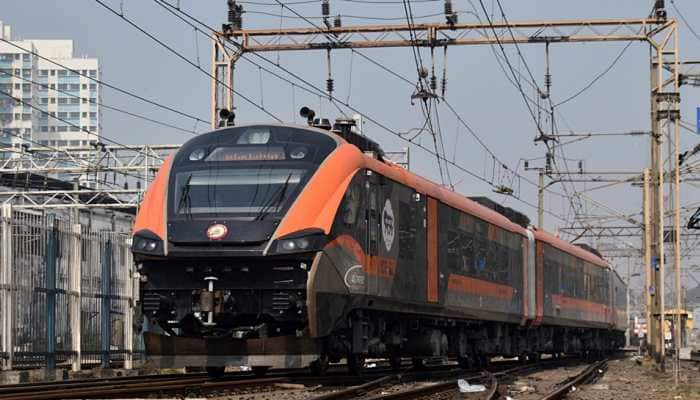Nepal should not become 'boxing arena' for India, China: Chinese Foreign Minister Wang Yi
China on Friday said Nepal should not become a "boxing arena" between India and China vying for influence in the Himalayan nation even as it called on New
Trending Photos
) Representational image
Representational image Beijing: China on Friday said Nepal should not become a "boxing arena" between India and China vying for influence in the Himalayan nation even as it called on New
Delhi to treat Kathmandu as an equal partner.
Top diplomats of China and Nepal met here and discussed plans to open more border points for transit trade, a permanent arrangement for petroleum supplies from China and transit treaty to enable Nepal to access Chinese ports for travel and trade to reduce dependence on India.
"China has all along believed that countries irrespective of their size are equal. China and Nepal have always treated each other sincerely and as equals. We hope that the same policy and practices will also be adopted by India," Chinese Foreign Minister Wang Yi said at a press conference with his Nepalese counterpart Kamal Thapa.
"A stable Nepal enjoying development fully serves the interests of both China and India. So in other words I would like to say that Nepal is a great place for mutually beneficial cooperation between China and India, not a boxing arena for China and India," he said.
Wang made the remarks while answering a question on India-China competition over Nepal.
"China, India and Nepal are close neighbours connected by the same mountains and rivers. This makes three of us a natural community of shared interest. This is why China has proposed the development of a China-India-Nepal Economic Corridor. It is all about common development and prosperity.
Ultimate goal is to form community of shared future of the three of us," he said.
Both Wang and Thapa avoided any references to the Madhesi agitation while praising the new Constitution which has led to a major internal political crisis in Nepal.
On India-Nepal relations, Thapa said "immediately after the promulgation of the constitution there has been some misunderstanding between Nepal and India. Because of the India imposed unofficial obstruction on transit and supply of fuel and other essential commodities," he said referring to the transport blockade that Nepal alleged had been imposed by India but which has been strongly refuted by New Delhi.
"That caused a severe impact on the Nepalese society. It also had a negative impact on our economic growth. But I am very happy to say at this point of time that things are moving and improving," said Thapa who is also Deputy Prime Minister.
Referring to his two visits to India recently, he said "it seems that we are now able to clear the air of mistrust and misunderstanding and slowly things are moving and coming back to normal".
"Nepal has two big neighbours, China and India. We are very proud of that. Both countries are prospering. They are doing fantastic work on the economic development. That has always remained an inspiration to us," he said.
Thapa is the first high-level minister of the new Nepalese government to visit China.
During their talks, both the foreign ministers announced a series of measures to increase connectivity between their two countries including a transit treaty to overcome the blockade due to the Madhesi agitation over the new Nepalese constitution that led to severe fuel shortages in Nepal.
Thapa also said besides agreeing to open new border points, China is willing to consider Nepal's request for long term supply of petroleum products through Tibet at concessional rates due to high altitude transportation and taxation costs.
He thanked China for supplying 1,000 MT of petroleum products at the height of the Madhesi agitation.
Thapa said Nepal's new government is looking to diversify the procurement of petroleum products and urged China to open more trade routes along its Tibetan border.
Currently one border point has been opened and they are working to open few others. Significantly, both Wang and Thapa spoke of talks on a transit treaty for Nepal to reduce its dependence on India.
Thapa said the treaty would enable Nepalese to access travel and goods from other countries through Chinese ports and a joint working group will identify the transit points.
He also announced free visa facility for Chinese tourists saying that over 120,000 tourists visited Nepal before the devastating earthquake in April.
For its part, China removed travel warning to Nepal clamped after the quake, declaring it as safe for travel.
Thapa also assured that Nepal will continue to crackdown on Tibetans crossing from Tibet to Dharmasala to meet Tibetan spiritual leader the Dalai Lama.
"We have consistently followed the one-China policy. I would like to reiterate once again that Nepal will not allow any activities that infringe on China's sensitivities on Tibet," he said.
On India, Thapa said, "Nepal has unique relations with both the countries. With India also we have excellent relations, social, cultural religious affinity and proximity has strengthened bilateral relations with India".
The Indian media at the event was not given an opportunity to ask questions.
"Similarly with China we have so many common areas socially, culturally also we are bound together. The peace harmony, compassion, philosophy propounded by Lord Buddha has alway remained as a cementing factor in our relations.
"For Nepal there is no need to play each other. We have our own type of relations with India. Similarly we have special relations with China. So we are very happy with that and will continue in future with strengthening relations with both the countries. That is the density that we have to live with," Thapa said.
"Nepal is situated between India and China. India and China, the large countries are the only neighbours of Nepal. That is not a shortcoming for Nepal. It is a geographical advantage for Nepal. I certainly hope that Nepal will maintain sound relations with both countries and I also believe that China and India should work together to tap our respective strengths to help Nepal accelerate its development," he said.
Stay informed on all the latest news, real-time breaking news updates, and follow all the important headlines in india news and world News on Zee News.
Live Tv







)
)
)
)
)
)
)
)
)
)

